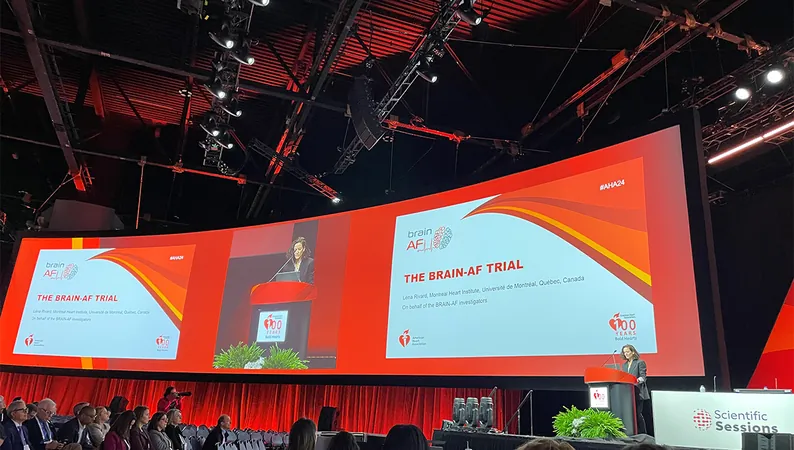
Study Debunks Rivaroxaban's Potential in Preventing Cognitive Decline among Young Atrial Fibrillation Patients
2024-11-16
Author: William
Introduction
A groundbreaking study presented at the American Heart Association 2024 Scientific Sessions has found that administering rivaroxaban (commonly known as Xarelto) to adults under 65 years old with atrial fibrillation (AF) does not reduce their risk of cognitive decline, stroke, or transient ischemic attack (TIA). This research, known as the BRAIN-AF trial, signifies a crucial turning point in how anticoagulation treatments are perceived for younger patients diagnosed with AF.
Background of the Study
Dr. Léna Rivard from the Montreal Heart Institute led the presentation, underscoring that the initial belief that early oral anticoagulation in younger AF patients without cardiovascular risk factors could prevent serious health issues is misguided. "In patients with AF at low risk of stroke, anticoagulation with daily rivaroxaban does not lead to any statistically significant reduction in cognitive decline, stroke, or TIA compared to placebo," Rivard stated.
Details of the Trial
The trial enrolled over 1,400 patients, but was halted early due to findings of futility, ultimately analyzing data from 1,235 participants over an average follow-up of 3.7 years. Despite using the Montreal Cognitive Assessment to gauge cognitive decline, the results were alarming: 18% of patients experienced a two-point drop in scores, raising concerns about understanding the underlying causes of this phenomenon in a seemingly healthy population.
Expert Opinions
Experts, including Dr. Andrea Russo and Dr. Sana Al-Khatib, highlighted the significance of these findings. They emphasized the necessity of further research into the intricate relationships between AF and cognitive decline. Dr. Kamel from Weill Cornell Medicine remarked, "This trial answers an important question: there's no reason to expand anticoagulation indications to younger and healthier individuals to enhance brain health."
Future Research
Moreover, Rivard and her team are continuing their research, delving into MRI data and biomarkers collected from participants, anticipating richer insights to emerge from these analyses. The study's conclusions prompt a reconsideration of treatment strategies for AF patients, especially as new therapies develop in this field.
Conclusion
In closing, while rivaroxaban remains a leading medication for stroke prevention in certain demographics, this study challenges its efficacy in younger patients, reiterating the importance of individualized treatment plans and further investigation into cognitive preservation strategies for those with atrial fibrillation.









 Brasil (PT)
Brasil (PT)
 Canada (EN)
Canada (EN)
 Chile (ES)
Chile (ES)
 España (ES)
España (ES)
 France (FR)
France (FR)
 Hong Kong (EN)
Hong Kong (EN)
 Italia (IT)
Italia (IT)
 日本 (JA)
日本 (JA)
 Magyarország (HU)
Magyarország (HU)
 Norge (NO)
Norge (NO)
 Polska (PL)
Polska (PL)
 Schweiz (DE)
Schweiz (DE)
 Singapore (EN)
Singapore (EN)
 Sverige (SV)
Sverige (SV)
 Suomi (FI)
Suomi (FI)
 Türkiye (TR)
Türkiye (TR)